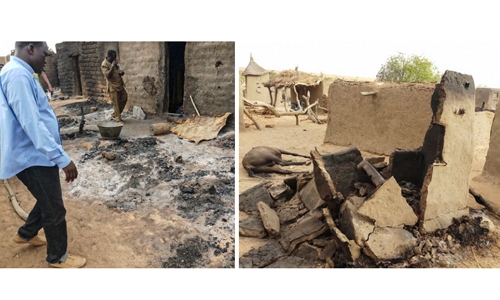Massacre toll in Mali cut to 35
A massacre at a village in central Mali that according to early estimates killed 95 people left 35 dead, the authorities said Wednesday, giving a final toll. Twenty-four of the dead were children, the government said in a statement which added that six people had been detained “following routine checks”. Gunmen late Sunday surrounded the village of Sobane Da, in an ethnic Dogon enclave, killing inhabitants and torching homes in a seven-hour assault, survivors said. The killings stirred fears of tit-for-tat violence in the region, an ethnic patchwork where tensions have soared since the emergence of a violent jihadist-led movement in 2015.
The government had given a provisional figure of 95 dead and 19 missing. That toll was based on early information from soldiers and the district mayor who visited the village, which is also known as Sobane-Kou. But by Monday night there was some doubt and the revised figure was confirmed the following day, officials said. “This number is based on a painstaking count carried out by a team comprising officials from the (Malian) civil protection force, forensic doctors (and) the public prosecutor of Mopti” region, Wednesday’s statement said.
About a hundred women had succeeded in fleeing to the village of Koundo, and this was one of the causes of the confusion, it said. The government, referring to the risk of another turn in the cycle of violence, also urged local people “not to fall into the trap of guilt by association and revenge.” Ethnic violence in central Mali surged after a predominantly Fulani jihadist group led by preacher Amadou Koufa emerged in 2015. On May 16, the UN peacekeeping mission in Mali, MINUSMA, announced it had recorded “at least 488 deaths” in attacks on Fulanis in the central regions of Mopti and Segou since January 2018. Armed Fulanis “caused 63 deaths” among civilians in the Mopti region over the same timespan, it said.
In the bloodiest raid, about 160 Fulani villagers were slaughtered on March 23 at Ogossagou, near the border with Burkina Faso, by suspected Dogon hunters. The Fulani are primarily cattle breeders and traders, while the Bambara and Dogon are traditionally sedentary farmers. In the heart of the Sahel, Mali is one of the world’s poorest countries. Unrest in its volatile central region coincides with an ongoing jihadist campaign that the government is struggling to contain, despite military support from France and UN peacekeepers.
Related Posts

